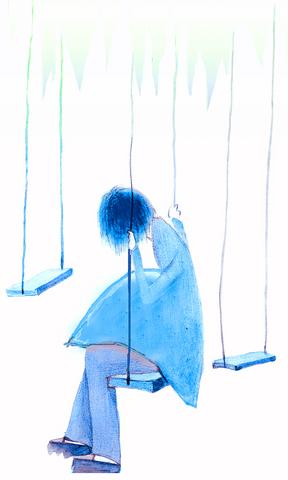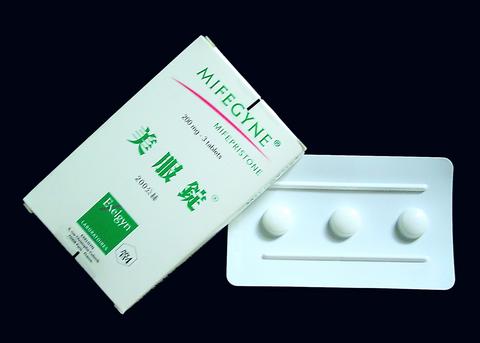When 17-year-old Lin-lin needed an abortion, she knew just the person to turn to for help -- her sister.
"She's eight years older than me and had already had two abortions and was a pro at it," the travel agent, now 22, recalled. "The funny thing though, is when I told her about it, she said she needed one, too." The sisters headed to a clinic in Taoyuan, one of the many nationwide that provides abortions, no questions asked.
Lin-lin's sister, having already been to the clinic twice before, knew the staff well, but Lin-lin was not so at ease.

"I walked in tentatively and was trembling," she said. "The place was dark and looked really suspicious, but my sister held my hand and said everything would be fine."
There were two beds in the operating room, and the older was first. "I watched the doctor insert a tube into her, about three or four centimeters wide, and begin the suction," Lin-lin described.
Blood began to collect in a clear box in between the operation beds. In a few minutes it would be her turn.

Stories like Lin-lin's aren't unusual. According to the Institute of Family Planning, now a part of the Department of Health, roughly 300,000 abortions were performed in 1996, the most recent year for which statistics are available.
But what's unknown is exactly how many minors such as Lin-lin obtain an abortion every year. Supposedly, any woman under the age of 20 must have parental permission before undergoing the procedure, but doctors at small clinics such as the one Lin-lin visited rarely follow the rule.
This loose regulatory framework that allows any woman regardless of age to undergo the NT$7,000, 10-minute procedure, however, is perhaps the reason why abortions are so common in Taiwan.
While Lin-Lin's two abortions went off without a hitch -- the second was a day after her 18th birthday -- she vows never to have it done again.
"For a whole week I bled and cried," she said recalling her first experience.
An easier way
Recently, a new drug, the RU-486 abortion pill, was introduced to the Taiwanese market and has helped abortions to become even easier and more convenient.
Classified as a class-four controlled substance, the abortion pill is legal only if given by doctors and administered within his or her sight. The route of every packet from its importer, doctor, and patients, are strictly monitored by the Bureau of Controlled Drugs.
But some doctors worry that knock-offs smuggled from China pose a grave risk to women's health. The black-market pills are available under the counter at some pharmacies.
One doctor recalled the case of a woman who had purchased such medication from her neighborhood druggist and suffered profuse bleeding.
"The woman almost fainted as she walked into my office," he said. "She was very pale. I found out she had been bleeding for almost a month; she had lost nearly half of her blood."
But despite the woman's case, the doctor said taking RU-486 is safe -- provided that women do so under a physician's care -- and he wouldn't hesitate to prescribe the pill.
"Under professional guidance, 95 percent of women can successfully abort without any problem," he said, adding that his clinic performs five operations to every one RU-486 prescription he writes.
Those who ask for operations often want to "just get it over with quickly," while pill-takers prefer to stay away from the operation table.
The attraction of this abortion pill also lies in its easy formula. Within the first seven weeks of pregnancy, the woman takes 600mg of Mifepristone. After a one to two-day period, 400mg of Misoprostol is administered. Within three hours of that, the abortion is complete as the woman bleeds the fetus from her uterus.
According to industry professionals, roughly 75,000 RU-486 packages have been prescribed since the health department approved their sale in Taiwan in June last year.
Cheng Chun-jie (
But like his colleagues, Cheng says the abortion pill is safe if properly administered. "It's not safe if it's misused," he said. "The danger lies in the lack of professional monitoring."
Loose enforcement of rules
While RU-486 is becoming popular, there are still plenty of clinics that will provide an abortion without asking too many questions.
Though Lin-lin was just 17 when she had her first abortion, doctors did little but ask her and her sister to sign waivers, just in case something should go wrong during the procedure.
And there's plenty of evidence that other minors could easily obtain an abortion as well.
I'm 18, and along with a 16-year-old friend, I recently visited several clinics in Taipei. We both posed as pregnant teenagers. In most cases doctors seemed willing to schedule appointments to perform the procedure with little reservation.
At the first clinic we tried, the lights were low and the air conditioning could barely be felt. Metal bars separated us from the nurses staffing the counters. A doctor who appeared to be in his 50s said he could perform an abortion for me, but the 16-year-old would need parental permission. When asked about the age requirements for getting the go-ahead, he replied by telling us "not [to] ask too many questions."
The second clinic was more welcoming. The lights were bright and the reception area kept clean.
But the clinic's apparently warm environment belied the nurses' cold demeanor. Before the conversation began, the nurses explained that all transactions would be in cash because the clinic isn't covered by National Health Insurance.
And while an abortion for me was be no problem, the nurse said the doctor might turn away the 16-year-old. "Of course, there are always exceptions," she said. "You can discuss it with the doctor and try and convince him."
She said it could help to talk to the doctor together, and he might feel pity for her.
The nurse wouldn't say how many abortions were performed at the clinic each month, but said the youngest patient ever to undergo the procedure there was 14.
`Artificial miscarriages'
What makes it so easy for minors or any woman to obtain abortions in Taiwan is the pseudo-legal status that allows clinics -- but not doctors at major hospitals -- to perform the procedure.
According to the law, "artificial miscarriages," the legal nomenclature for abortion, can only be performed if the "mental or physical health" of the mother or child is at risk. The exceptions include cases of rape and incest. If the woman is under 20, she must obtain her parents' consent. Married women must also receive permission from their husbands.
But the general consensus among doctors is that enforcement of the law is nonexistent, because it's vague as to what is considered a risk to women's health.
For this reason, abortions remain largely unavailable at big hospitals, as they require documentation of a pregnancy's danger to a woman's or child's "mental or physical health."
For most women, that leaves just street clinics -- some of them fly-by-night operations -- as the only available option.
"Major hospitals don't perform such procedures if [the patient] has no critical health condition," said Cathay General Hospital's Cheung. For these patients, he refers them to smaller clinics that might be more helpful.
Of Taipei City's 187 gynecology clinics, 19 that were contacted by the Taipei Times claimed that they follow the law.
"[The doctor] only performs abortions for married women and unmarried women if `health conditions' warrant it," nurses at the Giling clinic said in response to a telephone inquiry.
And although the Giling nurses earlier freely admitted to having performed abortions on women as young as 14, the official line was much different when they knew they were speaking to a reporter: "Only if both parents are present" will an abortion be performed for someone younger than 20, nurses said.
What makes this all this behind-the-scenes abortion available and possible is the "one eye open, one eye closed" policy health officials work with. According to Yao Po-tsun (游伯村) at the Taipei City's Department of Health, the reason why there haven't been any new statistics on abortion in Taiwan since 1996 is because officials would rather keep their heads in the sand. "The number would probably turn out to be so large that [health officials] are afraid to even touch on the subject," he said.
What's more, experts say the lack of education about contraceptives is why many women use abortion as their only means of birth control.
Lin-lin's sister, 30, has had five abortions. Not wishing to follow in her sister's footsteps, she now uses an intrauterine device, or IUD, to prevent future pregnancies.
The device promises a 98.5 percent rate of success.
Cheung said he also has to educate women about contraceptives. Citing one "ridiculous case," he recalled a 46-year-old mother of five who had visited him for a 16th abortion.
"I yelled at her," the doctor said.

Climate change, political headwinds and diverging market dynamics around the world have pushed coffee prices to fresh records, jacking up the cost of your everyday brew or a barista’s signature macchiato. While the current hot streak may calm down in the coming months, experts and industry insiders expect volatility will remain the watchword, giving little visibility for producers — two-thirds of whom farm parcels of less than one hectare. METEORIC RISE The price of arabica beans listed in New York surged by 90 percent last year, smashing on Dec. 10 a record dating from 1977 — US$3.48 per pound. Robusta prices have

A few years ago, getting a visa to visit China was a “ball ache,” says Kate Murray. The Australian was going for a four-day trade show, but the visa required a formal invitation from the organizers and what felt like “a thousand forms.” “They wanted so many details about your life and personal life,” she tells the Guardian. “The paperwork was bonkers.” But were she to go back again now, Murray could just jump on the plane. Australians are among citizens of almost 40 countries for which China now waives visas for business, tourism or family visits for up to four weeks. It’s

The resignation of Taiwan People’s Party (TPP) co-founder Ko Wen-je (柯文哲) as party chair on Jan. 1 has led to an interesting battle between two leading party figures, Huang Kuo-chang (黃國昌) and Tsai Pi-ru (蔡壁如). For years the party has been a one-man show, but with Ko being held incommunicado while on trial for corruption, the new chair’s leadership could be make or break for the young party. Not only are the two very different in style, their backgrounds are very different. Tsai is a co-founder of the TPP and has been with Ko from the very beginning. Huang has

Beyonce on Sunday finally won the Grammy for the year’s best album for her culture-shaking Cowboy Carter, as rapper Kendrick Lamar posted a clean sweep on a night that served as a love letter to fire-ravaged Los Angeles. Chappell Roan, Charli XCX, Doechii and Sabrina Carpenter emerged as big winners at the performance-heavy gala, while heavyweights Taylor Swift and Billie Eilish went home empty-handed. Beyonce’s win for Cowboy Carter now makes her the most nominated, most decorated artist at the awards show ever — as well as the first Black woman to claim the top prize in this century. The triumph was all